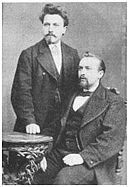August Freudenthal

August Freudenthal (born September 2, 1851 in Fallingbostel in the Lüneburger Heide ; † August 6, 1898 in Bremen ) was, like his older brother Friedrich , a native writer of Lower Germany, who was best known for his travelogues - written in standard German . He also worked as a journalist, editor and magazine founder.
biography
Son of a craftsman, August Freudenthal came to the small heath village of Fintel near Soltau in 1862 at the age of 11 , where he was supported by his grandfather, the teacher, so that he became a private tutor in Luhmühlen near Winsen / Luhe at the age of 15.
After later attending the teachers' seminar in Stade , he worked in this profession for a few years, but then became an employee and later editor of various Bremen newspapers.
In the eighties of his century he (at that time already editor of the newspaper Bremer Nachrichten ) roamed his Lüneburg Heath as planned .
The most important result of Freudenthal's work can be described as his four-volume (main) work Heidefahrten (1890–1897) , which is almost programmatic . In these travel reports , which in a certain sense are also considered important contemporary documents today, he skilfully mixes factual and historical information with his personal narrative style.
In addition to this work, he wrote some plays (e.g. After Midnight and God Chance in 1874 with performances in Bremen, Dresden, Hanover, Schwerin, Coburg, Wiesbaden and Posen as well as Der Herr Steuerrat , Incognito , Zopf and Satire and Jealousy approx. 1882-1892). But his lyric poems were more successful, some of which were later set to music.
In 1875 he was co-editor of the anthology of Bremer Dichter des 19. Century and editor of the important poetry collection Die Heide (1890).
Especially his song O Schöne Tied has been translated into many languages (e.g. into High German, English, Swedish, Danish, Russian and Dutch); many emigrants probably wore it on their lips during their ship passage to America.
In addition, Freudenthal wrote numerous other prose works about the heath, which were read a lot and he collected, similar to the Brothers Grimm , legends and fairy tales of his region before him . ( From Lower Saxony (I) 1893; (II) 1895).
In 1895 August and his brother Friedrich first published the magazine Niedersachsen , which after an interruption from 2001 to 2004 is now published by the Lower Saxony Homeland Association . In the same year his only book written in the Low German language, the Heid-Ekkern, was published .
August Freudenthal died in 1898 at the age of only 47. His writings gave many people access to the then remote heathland landscapes in northern Germany.
On August 18, 1923, a monument in honor of August Freudenthal was inaugurated in Fallingbosteler Lieth; his grave in the park-like Riensberg cemetery was taken into custody by the Senate of Bremen in 1938 .
Works
- Poems . Verlag J. Küthmann's Buchhandlung, Bremen 1879, 165 pages
- Poems . 2nd edition, Carl Schünemann Verlag , Bremen 1888, 280 pages
- Heidefahrten described for friends of the heath , 1890–1897
- Volume I: Excursions in the high heath and in the river area of the Böhme . 1890 (second edition 1906)
- Volume II: Excursions on the northeast and southwest edges of the Lüneburg Heath. 1892
- Volume III: Excursions in the river areas of the upper Luhe and Oerke and in the heath of the former Verden monastery . 1894
- Volume IV: Excursions to the Wurster Heide, the Uelzen region and the Heidhehehe in the Teufelsmoor . 1897
- Heidefahrten - anthology . Unchanged reprint in one volume, Rotenburg / W. 1983
- Heideckern ("Heid-Ekkern") - düt un dat in noordhannöversch Platt . 1895 (new editions 1959 and 1989)
literature
As a German-speaking literary society, the Freudenthal Society in Soltau is dedicated to maintaining and spreading the Low German language and the work of the Freudenthal brothers .
Web links
- Literature by and about August Freudenthal in the catalog of the German National Library
- Freudenthal Society
| personal data | |
|---|---|
| SURNAME | Freudenthal, August |
| BRIEF DESCRIPTION | German author and journalist |
| DATE OF BIRTH | September 2, 1851 |
| PLACE OF BIRTH | Fallingbostel , Lüneburg Heath |
| DATE OF DEATH | August 6, 1898 |
| Place of death | Bremen |

